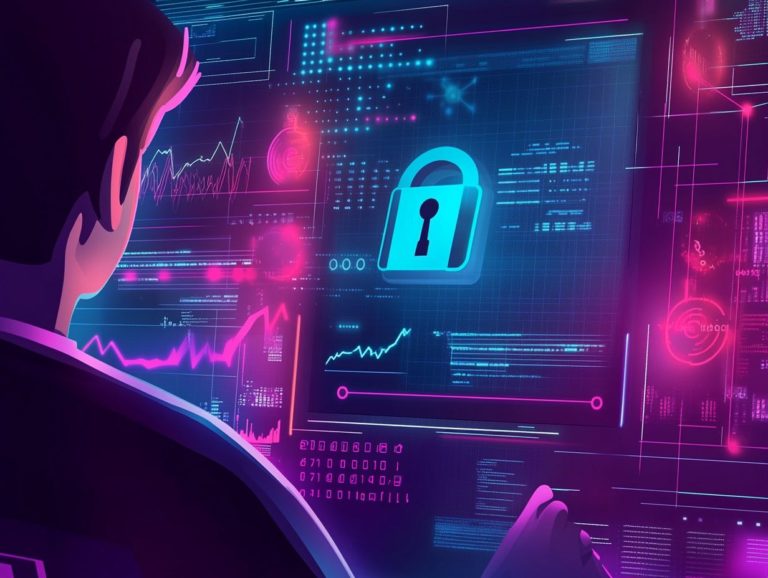the role of leadership in incident response
In an era where cyber threats are ever-present, the effectiveness of incident response heavily relies on strong leadership.
As organizations confront unexpected crises, having skilled leaders in place can mean the difference between chaos and a coordinated resolution. This article delves into the crucial role of incident response leadership, emphasizing the key qualities and strategies that distinguish effective leaders.
It addresses the common challenges they encounter and showcases how impactful leadership can pave the way for success through real-world case studies.
Discover the essential elements that empower leaders to adeptly navigate the complexities of incident response.
Contents
- Key Takeaways:
- Why Strong Leadership is Critical in Incident Response
- Qualities of Effective Incident Response Leaders
- Leadership Strategies in Incident Response
- Challenges Faced by Incident Response Leaders
- The Impact of Leadership on Incident Response Success
- Frequently Asked Questions
- What is the role of leadership in incident response?
- Why is leadership important in incident response?
- What qualities make a good leader in incident response?
- How can leaders prepare for an incident response?
- What are some challenges that leaders may face in incident response?
- How can leadership contribute to the success of incident response?
Key Takeaways:

Effective incident response leadership is crucial to swiftly mitigate and manage security incidents. Key characteristics and skills of a successful incident response leader include effective communication, adaptability, and decision-making abilities.
Leadership strategies such as clear delegation, efficient coordination, and regular communication are essential for effective incident response management.
Why Strong Leadership is Critical in Incident Response
Effective incident response leadership is essential in managing security incidents. It ensures that your response team is fully equipped to handle crises and mitigate risks tied to cybersecurity attacks.
Strong leadership fosters improved communication strategies among internal stakeholders. This enhances the team’s ability to analyze and manage incidents effectively.
As a leader, you guide the incident response team in crafting a robust incident response plan, enabling them to tackle both corporate and public incidents with confidence and authority.
Fostering knowledge in technology within the response team significantly bolsters your organization s preparedness against a spectrum of security threats and vulnerabilities.
Defining Incident Response and its Significance
Incident response is your systematic approach to managing and addressing security incidents within your organization. It ensures you take appropriate measures to minimize damage and restore normal operations.
This comprehensive process encompasses several critical phases: preparation, detection, analysis, containment, eradication, recovery, and lessons learned.
Each of these phases plays a pivotal role in enhancing your organization s overall security standing. By implementing effective incident management practices, you can respond swiftly to threats while gaining valuable insights through incident analysis and documentation.
This robust handling of security events helps you identify vulnerabilities, foster continuous improvement, and ultimately build resilience against future attacks.
Thus, adopting best practices in incident response is essential for safeguarding sensitive data and maintaining trust with your stakeholders.
Qualities of Effective Incident Response Leaders
Effective incident response leaders embody a distinctive blend of qualities that enable you to navigate complex crisis situations.
You foster collaboration among internal stakeholders, ensuring that your response team is not only cohesive but also equipped with the expertise needed to manage security incidents successfully.
Key Characteristics and Skills

The key characteristics and skills that define effective incident response leaders include strong technical knowledge, exceptional communication abilities, and a thorough understanding of risk assessment methodologies.
Your technical prowess enables you to quickly analyze complex issues, facilitating rapid troubleshooting and resolution of incidents. Being well-versed in cybersecurity frameworks allows you to identify vulnerabilities in systems, helping you mitigate risks before they escalate.
Equally important are your communication skills, which play a crucial role in maintaining clarity among team members and stakeholders during a crisis. By conveying critical information succinctly and promptly, you foster the collaboration necessary for successful incident resolution.
Your understanding of risk assessment methodologies equips you to prioritize incidents based on their potential impact. This ensures that resources are allocated efficiently and effectively, steering your organization toward its overarching goals of stability and resilience.
To apply what you’ve learned about incident response leadership, consider seeking further resources or joining training sessions aimed at enhancing your skills.
Leadership Strategies in Incident Response
Implementing effective leadership strategies is crucial for guiding your response teams through the intricate landscape of incident management. This approach not only ensures proactive planning but also builds a strong sense of responsibility among team members during crises.
By embracing these strategies, you position yourself to navigate challenges with confidence and clarity. This fosters an environment where your team can thrive even under pressure.
Best Practices for Managing and Leading a Response Team
To effectively manage and lead a response team, prioritize a blend of clear communication strategies, well-defined roles, and continuous incident preparedness training. This ensures that every team member understands their responsibilities during a security incident.
Regular drills are essential for simulating real-life scenarios the team may encounter. These exercises allow members to practice their roles and refine their responses under pressure. This enhances their readiness for actual events.
Keep detailed records! They re key to learning and improving for the future. Thorough documentation of every incident facilitates post-incident analysis and contributes to better future preparedness.
Implementing feedback loops encourages team members to share insights and lessons learned, nurturing a culture of continuous improvement.
By prioritizing proactive planning and efficient communication during incidents, response teams can significantly boost their effectiveness, ultimately minimizing the impact of any security challenges they face.
Challenges Faced by Incident Response Leaders
As an incident response leader, you face a myriad of challenges that can impede your ability to manage security incidents effectively. The ever-evolving landscape of cybersecurity threats is just one hurdle.
You also have to navigate the necessity of collaborating with external consultants, all while grappling with the complexities that arise during incident analysis in crisis situations. Each of these factors can complicate your efforts, making it crucial to stay adaptable and resourceful in your approach.
Common Obstacles and How to Overcome Them

Common obstacles in incident response often include communication breakdowns, a lack of technical expertise, and insufficient documentation of incidents. However, you can effectively address these challenges through structured training and clear communication strategies.
To tackle communication breakdowns, consider implementing regular debriefs and establishing a central communication platform. This ensures that all team members are informed and actively engaged.
Enhancing technical expertise is another vital area. Ongoing professional development programs, where team members participate in workshops and simulations, can significantly boost their problem-solving skills in real-time scenarios.
Maintaining comprehensive incident documentation is pivotal. Adopting standardized templates and creating continuous feedback loops will help refine processes, ensuring that future responses benefit from past experiences.
All these strategies underscore the importance of preparation and continuous improvement foundational elements for successful incident management.
The Impact of Leadership on Incident Response Success
The influence of effective leadership on the success of incident response is substantial. It directly shapes the efficiency of response protocols, uplifts the morale of the response team, and enhances the overall effectiveness of crisis management during security incidents.
Your approach to leadership can be the defining factor in navigating these critical situations. Start implementing these strategies today, and watch your team’s confidence soar!
Case Studies and Examples
Examining case studies gives valuable insights into incident response leadership. Different approaches can lead to various outcomes in managing incidents and recovering from major security breaches.
By looking into specific scenarios, you can observe how leadership styles, decision-making processes, and team dynamics critically influence crises. A swift and transparent approach in one organization may ensure timely containment of a data breach. In contrast, another entity’s hesitance to communicate effectively might result in prolonged downtime and reputational damage.
These contrasts in incident response effectiveness underscore the necessity for flexible leadership, especially in high-stakes situations. This emphasizes the need for thorough training and established protocols for incident management, ensuring you re always prepared when the unexpected occurs.
Frequently Asked Questions
What is the role of leadership in incident response?

The role of leadership in incident response is to provide direction, guidance, and decision-making during and after an incident. For a comprehensive approach, understanding the role of technology in incident response is also crucial, as leaders are responsible for coordinating and directing the response efforts and communicating with stakeholders.
Why is leadership important in incident response?
Leadership is crucial in incident response as it sets the tone for the entire effort. Effective leadership, along with understanding the role of simulations in incident response training, keeps the response organized, efficient, and focused on the end goal.
What qualities make a good leader in incident response?
A good leader in incident response remains calm under pressure and can make tough decisions quickly. They effectively communicate with all stakeholders and delegate tasks while adapting to changing circumstances.
How can leaders prepare for an incident response?
Leaders must actively prepare for an incident response! This involves creating a response plan, identifying potential risks, and conducting regular training and drills. Establishing clear roles and communication protocols is also essential.
What are some challenges that leaders may face in incident response?
Leaders may face challenges such as managing a large team with varying expertise, conflicting priorities, and effective communication with multiple stakeholders. Time constraints and limited resources can make it crucial to prioritize and make quick decisions.
How can leadership contribute to the success of incident response?
Leadership contributes to the success of incident response by setting the overall vision and goals for the effort. Clear communication and timely, informed decisions are vital, as is fostering a positive and collaborative team environment.
Start preparing your incident response plan today!






